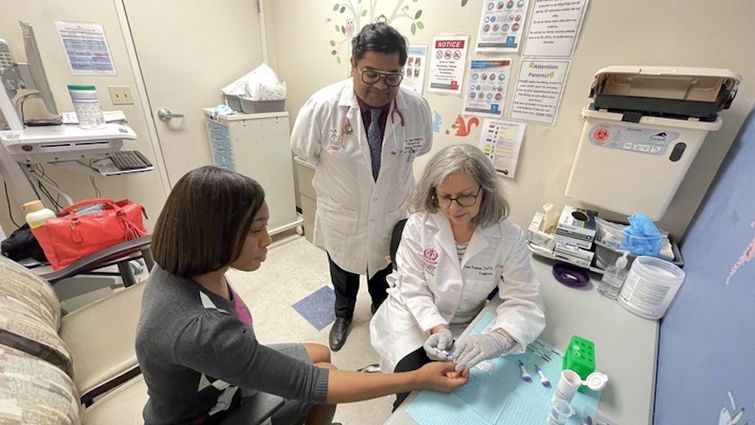
Drs. Akshat Jain and Lisa Roberts screen patient for sickle cell disease
Sickle cell disease (SCD) is a genetic blood disorder that affects millions of people worldwide, disproportionately impacting African Americans and other ethnic groups. While advances in treatment have improved the quality of life for many, early detection through routine screening remains critical to managing the disease and preventing severe complications.
The inherited disease is characterized by abnormally shaped red blood cells resembling a crescent or "sickle." Unlike healthy red blood cells, sickle cells are rigid and sticky, which can cause blockages in blood vessels, limiting the oxygen supply to various organs and tissues. This can result in episodes of severe pain known as "sickle cell crises," along with complications such as stroke, organ damage, and infection. Without proper management, SCD can lead to early death. The Sickle Cell Center at Loma Linda University Health offers a range of treatments aimed at providing relief from pain, managing symptoms, and addressing complications such as anemia and dehydration. Treatment options may include medications, intravenous (IV) infusions, blood transfusions, and gene therapy, all tailored to individual needs.
SCD affects about 100,000 people in the United States and more than 20 million people worldwide, according to the Centers for Disease Control and Prevention.
People with sickle cell trait carry the sickle cell gene but do not have sickle cell disorder. They may, however, experience some symptoms. Akshat Jain, MD, MPH, Director of Inherited Bleeding Disorders at Loma Linda University Children's Health, says many sickle cell trait carriers often remain unaware of their status. "If both parents carry the sickle cell trait, their child has a 25% chance of being born with severe sickle cell disease," Jain said.
Newborn screening for sickle cell disease has become a standard practice in many countries, including the U.S. As part of a comprehensive blood test shortly after birth, this screening can detect sickle cell traits or the whole disease. Early identification enables healthcare providers to closely monitor the child's health and implement treatments that drastically reduce complications and mortality.
In underserved areas, community-based screening programs have already uncovered surprising results. "At a recent screening at the Ghana Seventh-day Adventist Church, we diagnosed five families who had no idea they carried the sickle cell gene," Jain said. Events like these shed light on the importance of making sickle cell screenings more widely available, particularly in African American and Hispanic communities, where the disease is most prevalent.
The U.S. military, including the Army and Air Force, as well as the National Football League (NFL), are some organizations that screen individuals for the sickle cell trait. This screening is important due to concerns about muscle, heart, and kidney health, as carriers of the trait can face serious health challenges.
In addition to early detection, sickle cell trait can affect carriers later in life. Jain cited studies showing that carriers may face risks such as heart defects, sudden cardiac death, and a rare form of aggressive kidney cancer. "There are serious health implications, and knowing your status is key to addressing these issues," he said.
As a leader in sickle cell research, Loma Linda University is at the forefront of a national study focused on the health effects of sickle cell trait, with hopes to offer solutions through genetic therapies in the future. LLU offers Sickle Cell Trait National study is studying being a carrier affects human health in addition to its unique first of its kind dedicated clinic program for sickle cell trait offering medical care to families affected by sickle cell.
Read more about sickle cell disease here and learn about pediatric sickle cell care at Loma Linda University Health. If you or a loved one needs care for sickle cell disease, or wishes to be screened to know your sickle cell status ( carrier or disease ) you can request more information by calling or making an appointment at 909-651-1910.
